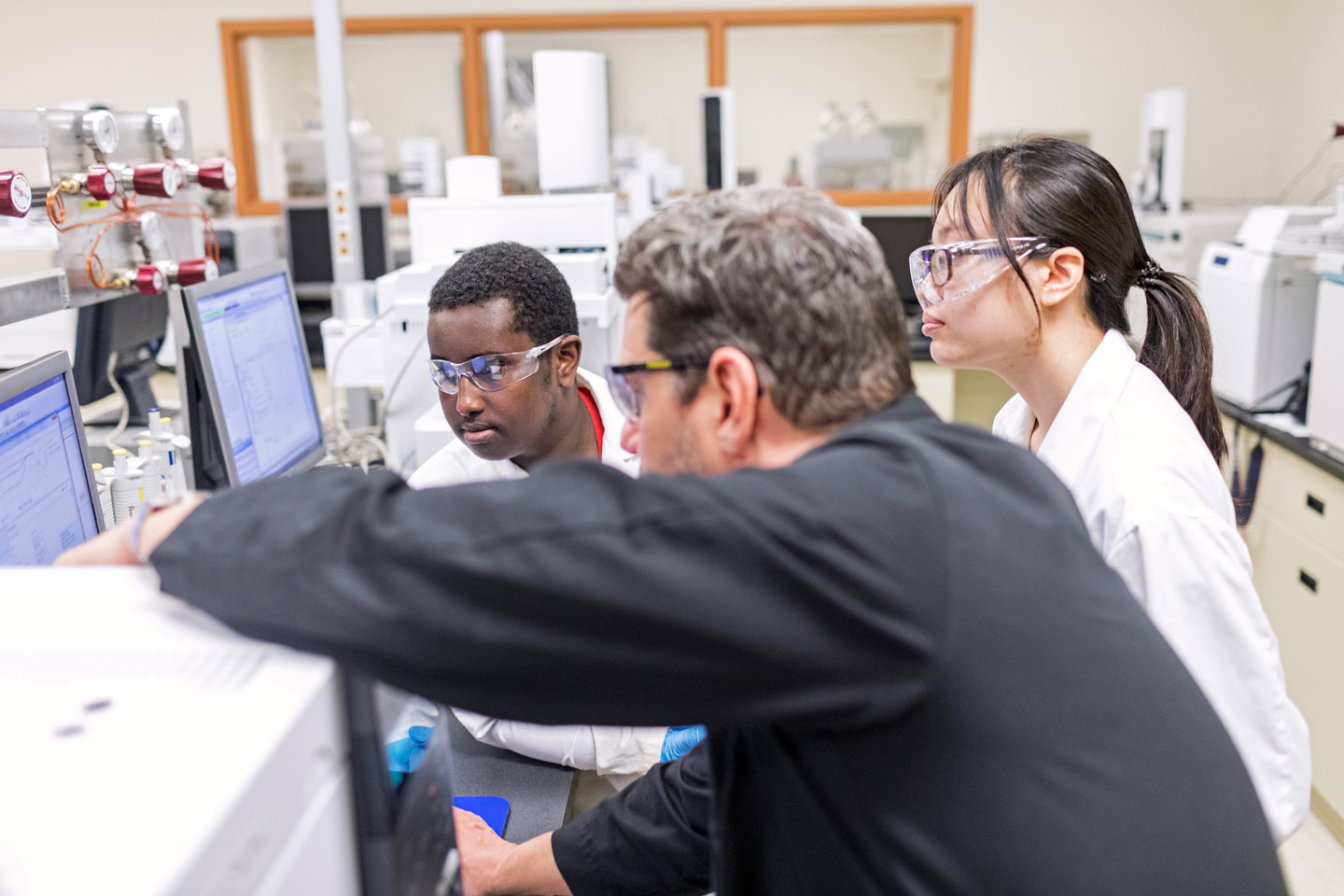Chemical engineering
The chemical engineering or chemical engineering is concerned with the implementation of materials or chemicals on an industrial scale. This makes use of the chemical engineering science and mathematical knowledge in order to arrive at a functioning, but also economical, safe and environmentally friendly process.
Basic tasks
The basic work equipment in chemical engineering is the accounting of amounts of substance and energy flows. By applying the laws of mass and energy conservation to whole plants, plant parts ( basic operations ) or individual components can be necessary for the construction and operation of this part data are calculated. In addition, find laws and insights of thermodynamics, heat and mass transport and reaction kinetics application.
As investment not only work efficiently but should also meet high safety requirements, considerations of mechanical and corrosive chemical durability of the materials used are essential.
In recent years, the focus has increasingly shifted Chemical Engineer from the process itself, through to customized product development. Here, the goal is to realize through optimization of the process parameters completely new product features. In addition, chemical engineers use numerical methods for the simulation of complex processes.
Curriculum
The study of chemical engineering is technically and scientifically oriented and provides necessary skills in mathematics, chemistry and physics with a focus on technical implementations and operational conditions ( plant safety, fire protection, explosion protection, business administration, law, labor sciences, etc.). The standard period of study is 10 semesters.
Study focuses and orientations vary between individual schools. At many universities, students are trained together in the engineering part of the training with mechanical engineers, while they occupy the same subjects in chemical subjects with students of the natural sciences. The program places high demands on mathematical and physical knowledge. Nationwide licensing restrictions do not exist. The student must possess and be able to work for several hours while standing no special sensitivity to common laboratory chemicals. In contrast to the study of chemistry, takes place due to the primacy of technical training, the majority of laboratory courses in general during the semester break.
In the basic studies the mathematical and scientific and technical fundamentals are taught. In addition to lectures and exercises the chemical Internships are an integral part of the course. The basic study generally includes the following courses and usually lasts four semesters ::
- Mathematics
- Computer science
- Physics
- Inorganic Chemistry
- Organic chemistry
- Analytical Chemistry
- Physical chemistry
- Biochemistry
- Toxicology
- Engineering Mechanics
- Manufacturing Technology
- Technical Drawing
- Thermodynamics
- Fluid Mechanics
- Measurement
- Automation
- Chemicals legislation
- Foreign language
- Laboratory work to the respective courses of chemistry
- An internship of several weeks (usually 6 weeks) in a typical operation of the mechanical engineering
In addition, students should also be able to meet their economic, social and environmental responsibility. Therefore, the study includes not only the scientific and technical subjects also compulsory and elective subjects to areas of environmental protection, technology assessment, engineering ethics as well as the energy and raw material savings.:
The main course is divided into two sections, each comprising 2 semesters; between these sections is the internship semester. In the first section of the main study are the specific engineering and basic science subjects that are important for the chemical engineering of importance at the center ( Mechanical, Thermal, Chemical engineering, automation engineering, Technical Biochemistry, Technical Chemistry interns, etc. ).
In the second part of the main study ( advanced studies ) strengthen scientific and engineering fundamentals done. This methodical and are typical procedure for solving tasks in the foreground. Are taught to recognize and solve large tasks also involving economic, environmental and social and application-related problems. Are in the main study, as in engineering disciplines common to produce two research papers (process and Großer Beleg ).
As part of the conversion of the diploma courses at Bachelor and Master is becoming apparent that the diversity of the bachelor programs rather enlarged and thus a university of origin is difficult. Furthermore, it is assumed that more than 90 % of students complete their studies with a master.
Disciplines
Disciplines of Chemical Engineering are:
- Plant control technology
- Plant technology
- Biochemical Engineering
- Chemistry Apparatus
- Technical Electrochemistry
- Catalyst development
- Food technology
- Mechanical Process Engineering
- Reaction Engineering
- Safety Technology
- Fluid Mechanics
- Technical Biochemistry
- Thermal Process Engineering
- (Technical ) Thermodynamics
- Separation processes
- Environmental
- Combustion technology
- Materials Science
Professional use
In business, there is an increasing need for interdisciplinary trained engineers who have both chemically - Stoffliches and scientific engineering expertise. The chemical engineer will come primarily in product development and in the use of goods that are produced mainly with procedural methods used. In the following industries Chemical engineers are primarily pursuing their professional activities:
- Chemical and related industries
- Pharmaceuticals - Industry
- Environmental and Energy Technology
- Biotechnology
- Food industry
- Paper industry
- Public service
Graduates can be employed both in the industrial and commercial sector as well as in administration, research and (where the additional necessary conditions for and skills in education ) also in teaching, training and education.
Organizations for chemical engineers
Important organizations for chemical engineers in Germany are:
- Society for Chemical Engineering and Biotechnology eV
- VDI with the trade organization Society for Process Engineering and Chemical Engineering (GVC )
- German Chemical Society eV
- American Institute of Chemical Engineers
Courses
The degree program in Chemical Engineering is offered, among others, the following universities in Germany as an undergraduate course of study or specialization:
- Provadis School of International Management and Technology
- Fachhochschule Aachen
- Beuth University of Applied Sciences Berlin ( pharmaceutical and chemical engineering)
- Technical University of Berlin
- Technical University of Braunschweig
- Hochschule Bremerhaven
- Technical University of Clausthal
- Hochschule Darmstadt ( h_da )
- Technical University of Dortmund
- Technical University of Dresden
- University of Applied Sciences Dresden
- College Emden / Leer ( Chemie-/Umwelttechnik, biotechnology)
- Friedrich- Alexander -University Erlangen- Nuremberg ( Chemical and Biological Engineering )
- Hochschule Esslingen
- Hochschule Fresenius
- Technical University of Kaiserslautern
- Karlsruhe Institute of Technology
- Fachhochschule Lausitz
- Fachhochschule Lübeck
- University of Mannheim
- FH Merseburg (Chemistry and Environmental Engineering )
- Technical University of Munich
- Fachhochschule Münster
- Hochschule Niederrhein ( Krefeld )
- Georg -Simon- Ohm - Hochschule Nürnberg
- Carl von Ossietzky University of Oldenburg
- University of Paderborn
- FH Kaiserslautern
- University of Ulm










